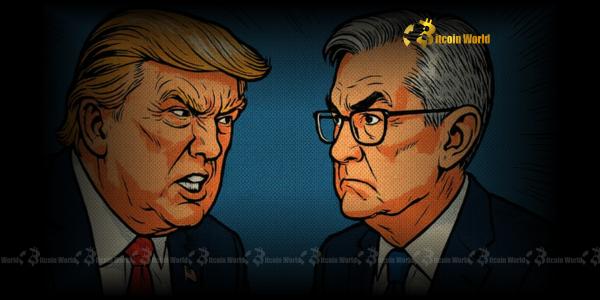Jerome Powell’s Unwavering Resolve: Navigating Donald Trump’s Attacks on the Federal Reserve
In the dynamic world of global finance and, by extension, the often-volatile cryptocurrency markets, the words and actions of central bankers hold tremendous weight. When the head of the world’s most influential central bank, the Federal Reserve, speaks, everybody listens. Recently, Jerome Powell, the esteemed Chairman of the Federal Reserve, found himself once again in the crosshairs of direct criticism from former U.S. President Donald Trump. His response? A concise yet effective affirmation: ‘I’m really focused on doing my job.’ This seemingly basic declaration brings profound ramifications for the self-reliance of the Federal Reserve, the stability of the US Economy, and the more comprehensive monetary landscape that indirectly influences crypto valuations.
Understanding the Core Conflict: Jerome Powell vs. Donald Trump
The tension between Jerome Powell and Donald Trump is not new. It’s a recurring theme that underscores an essential debate about the role and autonomy of central banks. Throughout his presidency, Trump frequently and vociferously criticized Powell and the Federal Reserve’s interest rate policies, especially when the Fed raised rates. His criticisms were unprecedented for a U.S. president, openly challenging the traditional independence of the central bank.
Powell, during these periods of intense political pressure, consistently maintained a stance of non-partisanship and commitment to the Fed’s dual mandate: achieving maximum employment and preserving price stability. His recent declaration, reiterated in the face of renewed attacks, serves as a powerful reminder of this unwavering dedication. It signifies that the institution’s decisions will be guided by economic data and its statutory goals, rather than political expediency or short-term electoral cycles.
Why is the Federal Reserve’s Independence So Crucial?
The concept of an independent central bank is a cornerstone of modern financial governance in many developed countries. The Federal Reserve, established in 1913, was designed to operate free from direct political influence precisely to avoid the pitfalls of short-term political thinking.
- Long-Term Stability: An independent Fed can make tough, unpopular decisions, like raising interest rates during an economic boom to prevent inflation, necessary for long-term financial health, without fear of immediate political backlash or losing elections.
- Credibility and Predictability: Market trust in the Fed’s decisions, based on economic fundamentals rather than political whims, enhances the reliability of financial policy, promoting investment and stability.
- Avoiding Inflationary Pressures: Political pressure on central banks to print money or keep interest rates artificially low can lead to inflation, eroding purchasing power and destabilizing the economy.
- Protecting the Financial System: An independent Fed can act decisively during financial crises, implementing measures to stabilize markets and prevent systemic collapse, even if those actions are politically unpopular in the short term.
The Intricacies of Monetary Policy and Its Reach
At the heart of the Federal Reserve’s responsibilities lies Monetary Policy, which refers to the actions taken by a central bank to influence the availability and cost of money and credit to help achieve national economic goals. The Fed utilizes several key tools, including the Federal Funds Rate, Quantitative Easing (QE), Quantitative Tightening (QT), Reserve Requirements, and the Discount Rate, to navigate complex economic conditions.
How Does This Impact the United States Economy and Beyond?
The stability and direction of the US Economy are profoundly influenced by the Federal Reserve’s actions. Interest rate decisions, influenced by the Fed, can impact borrowing costs, investment, spending, and job creation. These decisions have global repercussions given the US dollar’s role as the primary reserve currency.
For the cryptocurrency market, the connection is significant yet often indirect. Changes in interest rates can affect the attractiveness of different asset classes, potentially influencing capital flows into or out of cryptocurrencies. The perception of economic stability, shaped by the Fed’s policies, also plays a role in investor sentiment towards volatile assets like Bitcoin and Ethereum.
Navigating the Challenges: What Does Steadfastness Mean for the Future?
Jerome Powell’s unwavering focus on his job signifies a commitment to evidence-based decision-making and the long-term health of the economy, rather than succumbing to external pressures. This steadfast approach has implications for data-driven decisions, enhanced independence, market confidence, and potential market volatility in the future.
Concluding Thoughts: The Long-lasting Significance of Central Bank Autonomy
The ongoing narrative of Donald Trump’s criticisms against Jerome Powell and the Federal Reserve underscores the delicate balance between democratic accountability and institutional independence. Powell’s resolute response highlights the critical importance of an autonomous central bank for a predictable and stable economic environment. In a world where economic certainty is increasingly valued, the Fed’s ability to make decisions free from political pressure is not just a theoretical ideal but a practical necessity for the health of the US Economy and global markets, including the burgeoning cryptocurrency sector.
For more insights on the latest economic policy trends and their impact on global finance, explore our article on key developments shaping the US Economy and its future outlook.


